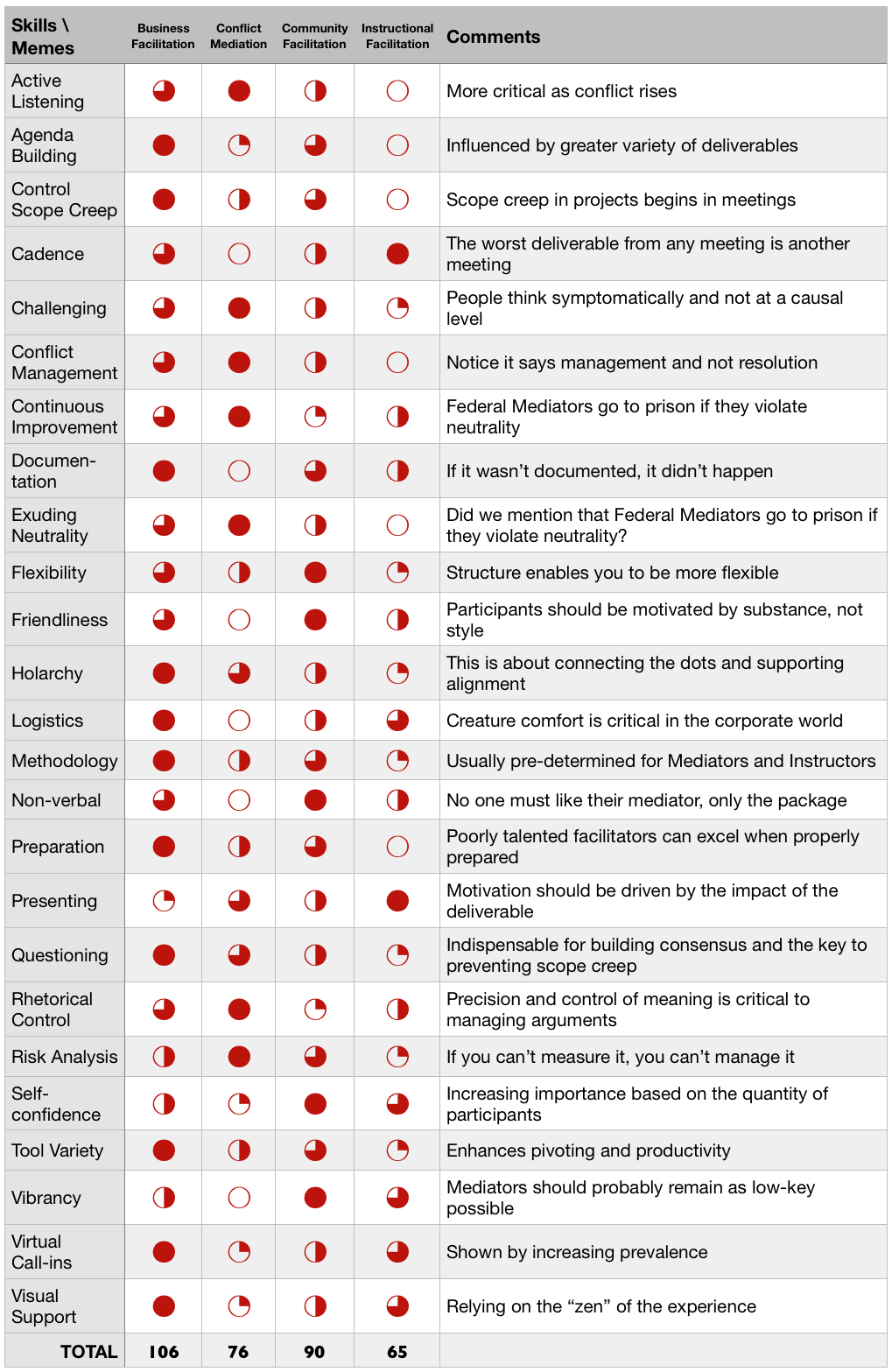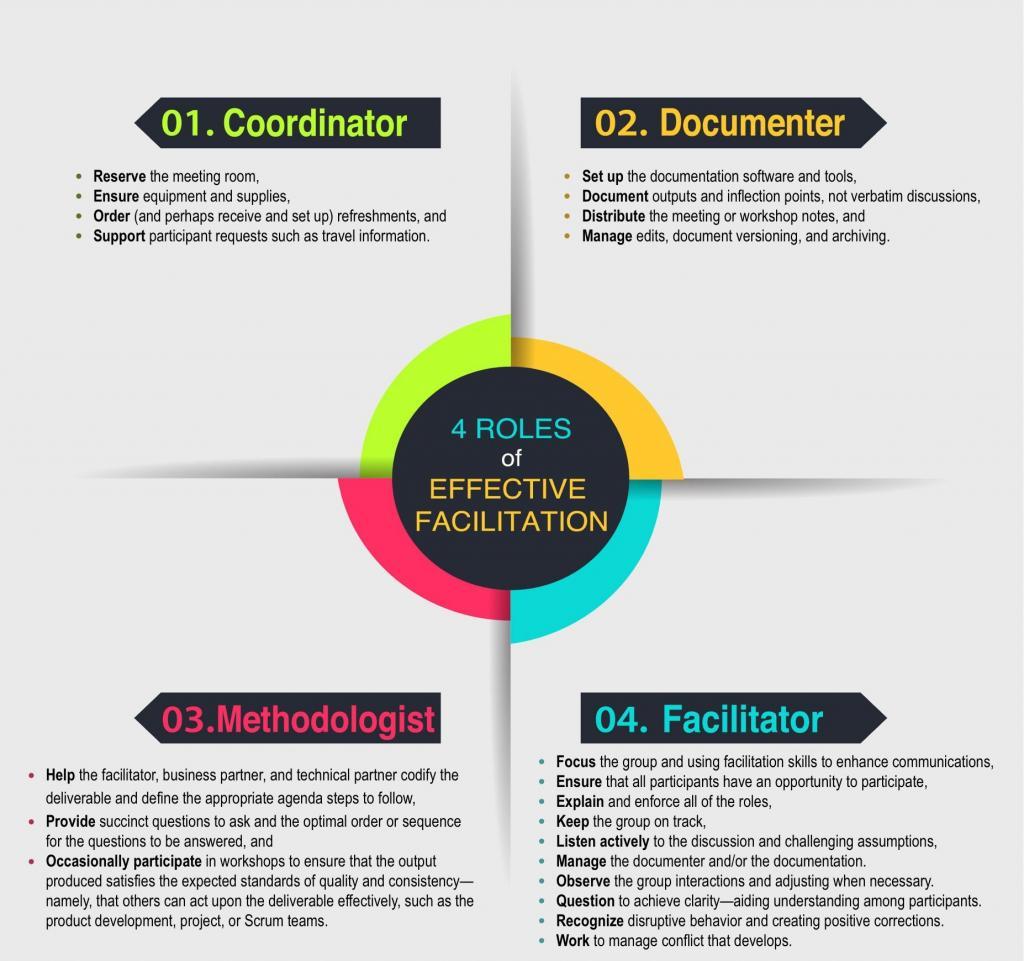We all have skills to perform many roles in life, such as switching quickly between parent and child when attending a family gathering, or switching quickly between friend and customer when shopping or dining with a significant other. Likewise, structured facilitator training enables facilitators to switch their consciousness quickly between the roles of facilitator and meeting designer.
NOTE: A facilitator can “show up” with someone else having performed the coordination, documentation, and meeting designer roles.
Four Roles of Effective Facilitation
-
Coordinator:
- This role is usually filled by admin support or by someone who will be the facilitator. The coordinator role is not always formal but must exist. Therefore, preparation responsibilities include:
-
-
- Reserve the meeting room,
- Ensure the arrival of equipment and supplies,
- Seeing to (and perhaps receiving and setting up) refreshments, and
- Giving support on participant requests such as logistics, timing, and travel information.
-
-
Documenter (or, Scribe):
- Occasionally this role is filled by an assigned scribe. But, frequently, the individual who is the facilitator performs this role alone. Regardless, the scribe must record the group’s ideas in an organized manner. However, documenters do not edit or change the content on their own. Responsibilities include:
-
-
- Set up the documentation software and tools,
- Capture outputs and inflection points, not verbatim discussions,
- Distribute the meeting or workshop notes, and
- Manage edits, document versions, and archives.
-
Neutrality
The scribe reacts to facilitator requests. Therefore, the role demands unbiased and neutral behavior during facilitated sessions. Any judgment, evaluation, or “improvement” of content potentially leads to a biased, distorted record of session output and must be avoided.
Deliverable
The meeting objective is not recording minutes, but writing down outcomes and outputs with a sufficient amount of detail to enable accurate review and understanding. The output must satisfy the session deliverable and provide information for the product or project it supports. After that, the document trail serves as the group record of what is agreed upon. The deliverable provides a sense of group accomplishment. Frequently, the document trail provides the only artifact of clear results from the group effort.
-
Methodologist (or, Meeting Designer):
- The meeting designer’s role details the approach or agenda steps used in a meeting. The source of the meeting design may change throughout the life cycle of a product or project. For example, in the planning phase, the meeting designer may be a strategic planner—someone who understands how to develop an action plan. In the analysis phase, the meeting designer may be an analyst, a process expert, a business architect, or some combination. In the design phase, the meeting designer may be a workflow or user experience specialist.
Responsibilities include:
-
-
- Help the facilitator, business partner, and technical partner codify the deliverable and define the appropriate agenda steps to follow,
- Provide succinct questions to ask and the optimal order for asking the questions,
- Occasionally participating in meetings to ensure that the meeting output meets the standards of quality and consistency—namely, that others can act upon the deliverable effectively, such as the product development, project, or Scrum teams. While meeting designers may suggest content, their most valuable input comes from raising additional questions for the group.
- The meeting designer’s role is not necessarily a single individual or even a person. For example, the executive sponsor could be the meeting designer in strategic planning. The meeting designer for buying travel tickets could be a system such as Expedia. The meeting designer could copy their design from a framework such as Scrum or SAFe. Business or technical partners (i.e., project management) frequently serve as meeting designers.
- The session leader is commonly the meeting designer. If that’s you, seek out the expert of the deliverable—one who clearly understands the questions to ask that will build the product needed, whether it’s planning, requirements gathering, prioritizing, “hot wash”, etc.
-
-
Facilitator:
- The session leader role demands many, many tasks. Thus, the success of the session depends on your real skills, knowledge, and abilities as a group leader. The facilitator’s role frequently includes ALL OF the traditional roles of “Facilitator” discussed below, along with the roles of “Coordinator”, “Documenter”, and “Methodologist”, discussed above. Therefore, managing context remains the key focus of the facilitator. Other responsibilities include:
-
-
- Create synergy by focusing the group and using your facilitation skills to enhance communications,
- Ensure that all participants have an opportunity to participate,
- Explain and enforce all of the roles,
- Keep the group on track,
- Listen actively to the discussion and challenge assumptions,
- Manage the scribe and/or the documents,
- Observe the group and adjust when necessary,
- Questions that achieve clarity—aiding understanding among participants,
- Recognize disruptive behavior and create positive corrections, and
- Work to manage conflict that develops.
-
Servant Leadership
The facilitator role creates an environment where every participant has the opportunity to collaborate, innovate, and excel. Listening to and observing the team’s progress will help you to better serve your participants. Above all, meeting leader skills reflect the core aspects of servant leadership.
NOTE:
Begin to sense how much easier and yet more effective you could be if someone else coordinated the room, participants, and supplies. If someone else provides a detailed agenda with the activities to launch and questions to ask. If someone else managed the documents at the end of it all.
In fact, as session leader, you could lead a planning workshop in the morning for one group, at one facility, and a user experience workshop, in a different facility, for another group in the afternoon. And you could do so easily if the responsibilities of the coordinator, meeting designer, and scribe are assignedy. Specialization of labor led to economical growth around the world, but few realize the same concept applies to the traditional role of a ‘facilitator.’
Facilitation Skills
The Project Management Institute (PMI):
PMI identified three key skills that needed to be improved in project managers. Specifically, they mention improvement that needs to be made in:
- Abstract thinking (i.e., pulling in multiple perspectives),
- Planning (i.e., upfront loading), and
- Facilitation
According to the National Speakers Association:
The principles and practice of facilitating, rather than preaching, provide the most effective means to create clear messaging. Therefore, listening and observing are core to the speaker’s success.
International Institute of Business Analysis™ (IIBA®):
The IIBA’s Guide to the Business Analyst Body of Knowledge® known as BABOK® Guide v3 stresses facilitation. When explaining disciplined and structured thinking, the term ‘facilitate’ appears 112 times over 514 pages. Statistically, approximately 25 percent of the BABOK‘s pages mention the need or link to the importance of facilitation.
The List Goes On . . .
Many sources sing the praise and importance of facilitation. Yet what real skills are required and are they shared equally across all meeting types?
For this unique assessment, we took our own Professional Facilitation curriculum and compared it with . . .
- International Association of Facilitators (IAF) 18 Core Competencies,
- International Institute for Facilitation (INIFAC) 30 Master Facilitator Competencies, and
- Institute of Cultural Affairs (ICA) 35 Certification Competencies
Facilitator skills are not equally important in every facilitated session or meme.
- Business Facilitation (or, formal organizations),
- Conflict Management (or, mediation),
- Community Facilitation (with a large stress on ‘helping’), and
- Instructional Facilitation (such as teaching, training, coaching, etc.)
The combined result below compares 25 facilitator skills and scores the importance of each against the four types of facilitation. Structured facilitator training best supports business facilitation, followed by conflict negotiation, and finally, community facilitation and instruction of various types as shown in the chart below.
For each skill, we force ranked from Low to High and to prevent repeating the same score. Next, we changed the PowerBalls symbols to numeric values from 5-High to 1-Low to create a total score that shows the impact of the skills across the four meeting types. Not surprisingly, structured facilitator training and skills are needed most for Business Facilitation followed by Community Facilitation, Conflict Mediation, and then Instructional meetings or training situations.

Facilitator Training Skills
NOTE: Some skills for mediation and instruction may not be included because they have little impact on structured facilitator training. For example:
- Curriculum Development
- Content Expertise
Bottom Line
Within consensus-building and decision-making situations, structured facilitator training proves to substantially help groups get more done, faster. For optimal facilitator training, begin with understanding the four roles of effective facilitation, namely coordinator, documenter, meeting designer, and facilitator.
Thus, if you are facilitating business meetings and want to improve your effectiveness, strive to improve your structured facilitator skills. Above all, your investment in facilitator training will pay for itself many times over.
______
Don’t ruin your career by hosting bad meetings. Sign up for a workshop or send this to someone who should. MGRUSH workshops focus on meeting design and practice. Each person practices tools, methods, and activities daily during the week. Therefore, while some call this immersion, we call it the road to building high-value facilitation skills.
Our workshops also provide a superb way to earn up to 40 SEUs from the Scrum Alliance, 40 CDUs from IIBA, 40 Continuous Learning Points (CLPs) based on Federal Acquisition Certification Continuous Professional Learning Requirements using Training and Education activities, 40 Professional Development Units (PDUs) from SAVE International, as well as 4.0 CEUs for other professions. (See workshop and Reference Manual descriptions for details.)
Want a free 10-minute break timer? Sign up for our once-monthly newsletter HERE and receive a free timer along with four other of our favorite facilitation tools.
______
With Bookmarks no longer a feature in WordPress, we need to append the following for your benefit and reference
- 20 Prioritization Techniques = https://foldingburritos.com/product-prioritization-techniques/
- Creativity Techniques = https://www.mycoted.com/Category:Creativity_Techniques
- Facilitation Training Calendar = https://mgrush.com/public-facilitation-training-calendar/
- Liberating Structures = http://www.liberatingstructures.com/ls-menu
- Management Methods = https://www.valuebasedmanagement.net
- Newseum = https://www.freedomforum.org/todaysfrontpages/
- People Search = https://pudding.cool/2019/05/people-map/
- Project Gutenberg = http://www.gutenberg.org/wiki/Main_Page
- Scrum Events Agendas = https://mgrush.com/blog/scrum-facilitation/
- Speed test = https://www.speedtest.net/result/8715401342
- Teleconference call = https://youtu.be/DYu_bGbZiiQ
- The Size of Space = https://neal.fun/size-of-space/
- Thiagi/ 400 ready-to-use training games = http://thiagi.net/archive/www/games.html
- Visualization methods = http://www.visual-literacy.org/periodic_table/periodic_table.html#
- Walking Gorilla = https://youtu.be/vJG698U2Mvo

Terrence Metz, president of MG RUSH Facilitation Training, was just 22-years-old and working as a Sales Engineer at Honeywell when he recognized a widespread problem—most meetings were ineffective and poorly led, wasting both time and company resources. However, he also observed meetings that worked. What set them apart? A well-prepared leader who structured the session to ensure participants contributed meaningfully and achieved clear outcomes.
Throughout his career, Metz, who earned an MBA from Kellogg (Northwestern University) experienced and also trained in various facilitation techniques. In 2004, he purchased MG RUSH where he shifted his focus toward improving established meeting designs and building a curriculum that would teach others how to lead, facilitate, and structure meetings that drive results. His expertise in training world-class facilitators led to the 2020 publication of Meetings That Get Results: A Guide to Building Better Meetings, a comprehensive resource on effectively building consensus.
Grounded in the principle that “nobody is smarter than everybody,” the book details the why, what, and how of building consensus when making decisions, planning, and solving problems. Along with a Participant’s Guide and supplemental workshops, it supports learning from foundational awareness to professional certification.
Metz’s first book, Change or Die: A Business Process Improvement Manual, tackled the challenges of process optimization. His upcoming book, Catalyst: Facilitating Innovation, focuses on meetings and workshops that don’t simply end when time runs out but conclude with actionable next steps and clear assignments—ensuring progress beyond discussions and ideas.




